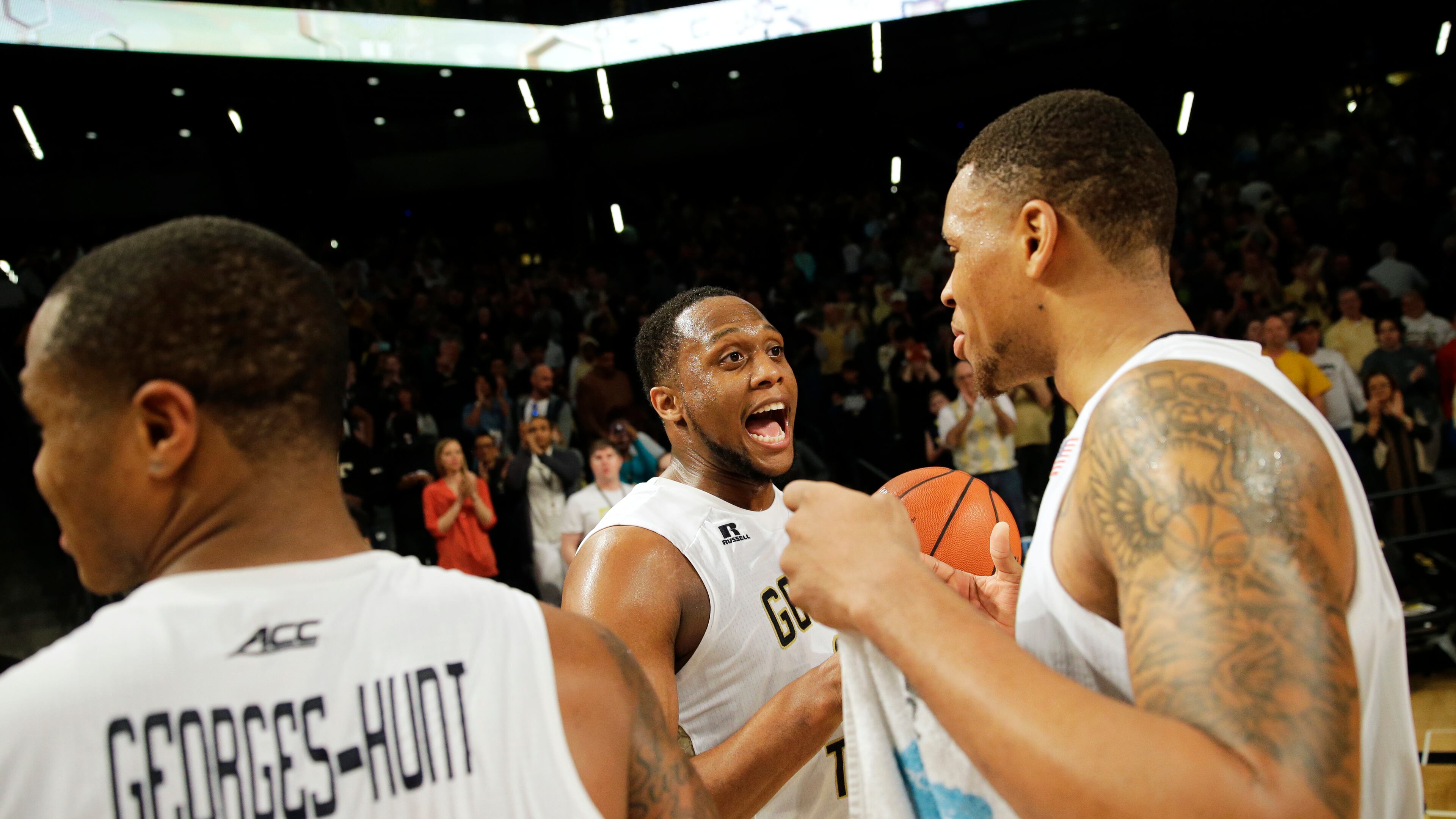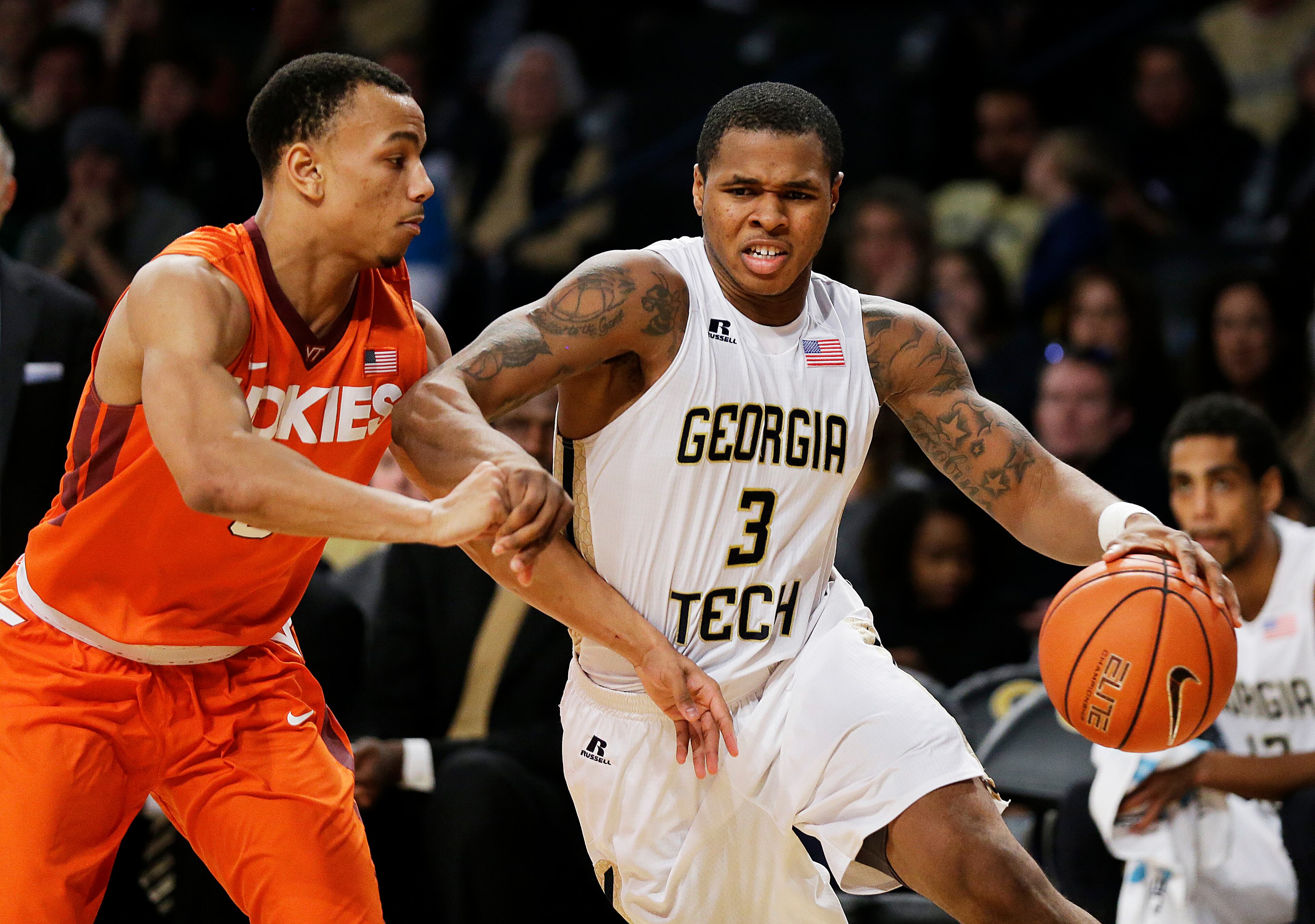What if Tech had beaten ETSU and Virginia Tech?

There’s no doubting the improvement that Georgia Tech made this season, jumping from 12-19 to 19-14 and an expected berth in the NIT.
For Tech’s recent history, it was a good season. For their standards of late, the Yellow Jackets were agonizingly close to a great season.
How close?
You may not want to know.
If Tech had beaten East Tennessee State and Virginia Tech instead of losing to them by one point each, the Jackets would probably be headed for the NCAA tournament.
Flipping the losses, which were arguably the team's two worst of the season, Tech would be 37th in RPI, according to rpiforecast.com, a gain of 29 slots over Tech's No. 66 standing as of Saturday morning. A team with that hypothetical profile – a 21-12 record, No. 37 RPI and No. 21 strength of schedule – would be on solid ground for an at-large bid to the NCAA tournament. Even changing one of the results would put Tech at No. 58 and at the far end of the bubble.
The cruel kicker is how seemingly avoidable the two losses – both at home – were.
Both were one-point defeats, 69-68 to ETSU and 78-77 to Virginia Tech . ETSU won on a last-second buzzer-beater 3-pointer after trailing by nine late in the first half and by four with 2:20 remaining in the game. The Jackets led Virginia Tech by 15 points in the first half and 10 with 4:32 to play.
The Hokies won in large part by making 23 of 27 free throws in the second half, taking advantage of Tech’s difficulties at guarding the ball, and holding the Jackets to two points in the final 3:33.

As it turned out, both were pretty good teams. ETSU is 23-11 and reached the finals of the Southern Conference tournament. Virginia Tech is 19-14, was 10-8 in the ACC and figures to earn an NIT bid. As things would have it, they were two spots apart from each other in RPI as of Saturday morning, ETSU at 86 and Virginia Tech at 88.
That said, they were costly and avoidable losses. The outcomes in both games could have changed with just slightly better execution or effort by Tech, or slightly worse play by the opponents. Even sheer chance could have made the difference.
The crazy part to me is, if the outcomes of the games were different, it wouldn’t have changed anything fundamentally about who and what the Jackets are. It’s not a matter of what might have happened had a player remained healthy or not transferred. It’s just maybe two plays out of a season of thousands – preventing an offensive rebound or focusing in more on a free throw or making the extra pass or not making a careless pass or calling one play instead of the other.
But from a win-loss and RPI standpoint, and hence a perception standpoint, it would have made a huge difference. This weekend, the team and fans would be anticipating the team’s first NCAA selection since 2010. And, once in the field, who knows what could happen for a team that finished the season playing its best of the season?
And, it perhaps goes without saying, my guess is that there would likely be little to no possibility of a coaching change.
Instead, Tech is headed to the NIT – a reward for a team that undoubtedly improved, played with effort and showed character by rallying to finish well after a discouraging start to the ACC season, but not quite what the Jackets wanted. Instead, the questions about a coaching change are very real , and the answers could have dramatic impact on the lives of coaches, players, staff and all of their families.
I don't know that it's unfair. In sports, at this level, for better or worse, the ultimate arbiter is wins and losses . And in college basketball, you get 31 opportunities (plus the conference tournament) to demonstrate who you are, and perhaps over that time, perhaps the breaks even out. No season comes down to one play. The last play of a game might be the one you remember, but it was preceded by dozens of plays that had the same impact.
And, obviously, it works the other way, too. If Marcus Georges-Hunt’s last-second shot against Notre Dame had been released with just a little less force, it might not have rolled over the rim and Tech would have lost, and who knows how that would have influenced the rest of the season?
Had Georges-Hunt made one less free throw Thursday night against Clemson – he was 15-for-16 – Tech couldn’t have forced overtime and instead would have lost to the Tigers. The stunning regular-season win over Virginia hinged on Quinton Stephens going 4-for-4 from 3-point range. He’s hardly a bad shooter, but what’s the probability of that happening? If we’re going off of his 31.8 percent accuracy from 3-point range, it’s 1 in 100 that he makes all four.
You could play this (somewhat pointless) game for a long time. (It makes me think of Harrison Butker’s overtime-forcing kick against Georgia in 2014. With perhaps two fewer feet on a kicked ball that traveled about 165 feet, the Jackets likely wouldn't have gone to the Orange Bowl and one of the most memorable and savored victories in school history instead would have joined the pile of gut-wrenching defeats to the Bulldogs.)
Rather than unfair, it's mind-boggling, and something that, if your life were invested in it, as it is for coaches and players, you would pull your hair out dwelling on it. As is said often, particularly last football season by Paul Johnson, the difference between winning and losing can be so thin. In this season, it could be argued that the difference between the NCAA and NIT, a margin which could have vast repercussions, was two baskets.
Crazy.

